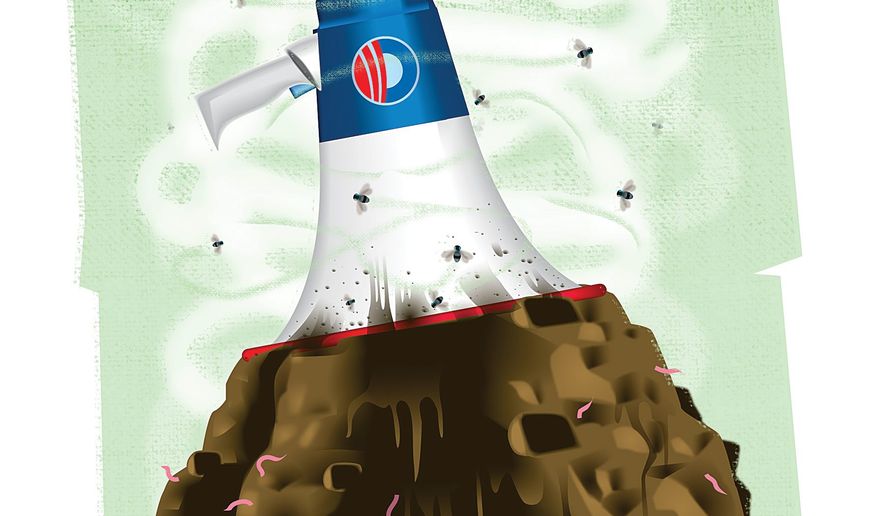OPINION:
President Obama’s Aug. 5 speech at American University was supposed to be reminiscent of John Kennedy’s speech there in 1963 in which he explained his preference of diplomacy over war against the Soviet Union.
It wasn’t evocative, though, and for some very obvious reasons. The Soviets were already armed with nuclear weapons. Iran isn’t. Kennedy’s speech was an honest statement seeking Soviet cooperation in a yet-to-be-negotiated nuclear test ban treaty. Mr. Obama’s speech contained — and relied on — so many falsehoods that it may be impossible to catalogue them all.
We can, at the very least, catch the president’s biggest and most dangerous untruths. To do that, we need to remember some of the most demonstrably false predicates to the deal.
The July 2015 final deal was preceded by a preliminary agreement in November 2013. In the preceding September, Mr. Obama said, “Iran’s supreme leader has issued a fatwa against the development of nuclear weapons.” A fatwa is a declaration of religious law. But Ayatollah Ali Khamenei, the supreme leader, has never issued any such prohibition.
The folks at the Middle East Media Research Institute (MEMRI) have done their homework. Though the Iranians have, time and again, assured us that they do not wish to develop nuclear weapons, there is no evidence whatsoever — even on the websites Ayatollah Khamenei publishes — that there is or ever was such a fatwa. For example, in a November 2014 report MEMRI, said, “Supreme Leader Khamenei has never issued such a fatwa and it exists nowhere in any online record of his official fatwas, even years after the issue has become central to the negotiations.”
In his Aug. 5 speech, Mr. Obama said, “The prohibition on Iran having a nuclear weapon is permanent. The ban on weapons-related research is permanent. Inspections are permanent.” He also said, “In July, we reached a comprehensive plan of action that meets our objectives. Under its terms, Iran is never allowed to build a nuclear weapon.”
“Never” seems a really long time to most of us but, to the president, it is at the most 15 years. In early April, while the negotiations were going on, but Mr. Obama said it would be a “relevant fear that in Year 13, 14, 15, they have advanced centrifuges that enrich uranium fairly rapidly, and at that point, the breakout times would have shrunk almost down to zero.”
As Israeli Prime Minister Benjamin Netanyahu has explained to the United Nations several times, the “breakout time” is the period from when Iran decides to build a nuclear weapon to the moment it has done so. Mr. Obama wants us to forget that the agreement he and Secretary of State John Kerry have negotiated will reduce the breakout time to zero even if Iran abides by the agreement.
There is no guarantee that Iran will even disclose all its nuclear facilities. Worse, there is a process by which Iran can object to an inspection and have the objection submitted to arbitration for 24 days — more than enough time to hide any evidence of cheating. And it absurdly enables Iran to gather its own forensic samples at certain sites without the inspectors enabled to obtain any other evidence.
Mr. Obama predicates all his arguments on the assumption that Iran will not enrich uranium, produce plutonium or otherwise renege on the inspections regimen for U.N. inspectors. He said, “There will be 24/7 monitoring of Iran’s key nuclear facilities. For decades, inspectors will have access to Iran’s entire nuclear supply chain, from the uranium mines and mills where they get raw materials to the centrifuge production facilities where they make machines to enrich it.” Well, no they won’t.
Mr. Obama must know that his statement is false, and outrageously so. Both his secretary of state and his national security adviser have admitted that they neither possess nor have read the secret side agreements between the U.N.’s International Atomic Energy Agency and Iran. Iran’s ambassador to the IAEA said on Aug. 3 that the agency is barred from divulging any of the terms of the side deals to the U.S. That came after Iran’s proclamation that no Americans can be among the inspectors.
In short, the president knows that his puffery regarding inspections — the only means of ensuring Iran’s compliance — is perfectly false.
And, as is his wont, Mr. Obama used his speech to try to convince us that any dissent or disapproval of his agreement is not just illegitimate, but malicious.
He accused the deal’s opponents of making common cause with Iranian hard-liners. He said that they display “the same mindset, in many cases offered by the same people, who seem to have no compunction with being repeatedly wrong .” This, from the president whose foreign policy errors have been so consistent and egregious that many allies, such as Saudi Arabia, have renounced American leadership.
Mr. Obama said that by killing the deal, Congress would accelerate Iran’s path to nuclear weapons. He said, as he has in the past, that the only choice is between his deal and war with Iran, and that war would be an “impulsive choice.”
Mr. Kerry said recently that the reason this deal isn’t being submitted to Senate ratification is that it’s impossible to get a treaty ratified anymore. In this case, ratification could be unattainable because it is dangerous to America and every ally we have in Europe and the Middle East. But the Corker bill will let it slide through Congress eventually. And Iran will get the nuclear weapons it has been seeking since the ayatollahs came to power in 1979.
• Jed Babbin served as a deputy undersecretary of defense in the George H.W. Bush administration. He is a senior fellow of the London Center for Policy Research and the author of five books, including “In the Words of Our Enemies.”




Please read our comment policy before commenting.